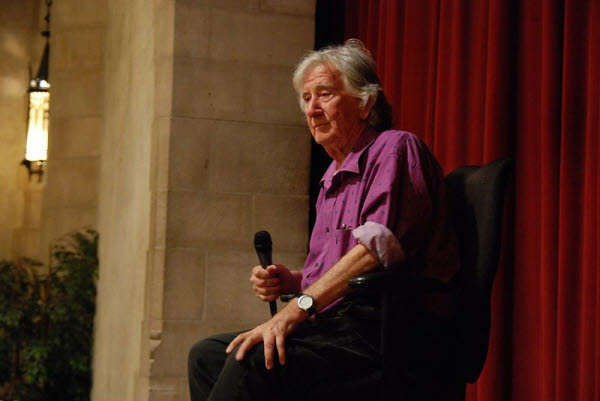Augusto Boal at Riverside Church in New York City 2008. Picture by Jonathan McIntosh
Augusto Boal, animation and education. Known for his work around forum theatre and the theatre of the oppressed, Boal has interesting things to say about animation and education
Temporary page
In Boal’s work around forum theatre, invisible theatre and the theatre of the oppressed we see some fascinating expressions of socio-cultural animation. He writes of theatre as the art of looking at ourselves:
The Theatre of the Oppressed is theatre in this most archaic application of the word. In this usage, all human beings are Actors (they act!) and Spectators (they observe!). They are Spect-Actors…. Everything that actors do, we do throughout our lives, always and everywhere. Actors talk, move, dress to suit the setting, express ideas, reveal passions – just as we do in our everyday lives. The only difference is that actors are conscious that they are using the language of theatre, and are thus better able to turn it to their advantage, whereas the woman and man in the street do not know that they are speaking theatre. (Boal 1992: xxx).
In these words we can see some immediate connections to what we do as informal and community educators.
What Boal has done is to work in workshops – perhaps with workers from a particular factory (Forum Theatre) or to take performance to the street (Invisible Theatre) where people are confronted with what at first sight appear to be events – but are revealed as theatre. He begins by seeking to integrate the group and to explore political and economic questions (2 days). In this there is an emphasis on exercise – ‘actors must work on their bodies to get to know them better and to make them more expressive’ (ibid.: 1). The group would then work for a couple of days on preparing ‘scenes’ (through exercises, games etc.). On the fifth day they may take the scenes to the street (Invisible Theatre) and then on sixth make a presentation to an audience (Forum Theatre).
What we can see in this is a fairly straightforward process that carries within in many of the concerns and a significant amount of the analysis that runs through Freire’s work. For example on dialogue: ‘I believe it is more important to achieve a good debate than a good solution’ (ibid. 230). However, two of the fascinating elements of this approach concern the animating force of performance; and the focus on emotion. In the case of the former, engaging in performance can bring forward questions, experiences and issues that are difficult to express in initially in words. It can reveal elements for the group to work on.
Second, Boal has picked up on the concerns of Stanislavski and the need to move beyond the mechanisation of the actor’s body into allowing emotion to shape the final form of the actor’s interpretation of a role. However, he is also at some concerns to explore that emotion. ‘The important thing about emotion is what it signifies. We cannot talk about emotion without reason or, conversely, about reason without emotion; the former is chaos, the latter pure abstraction’. (ibid.: 48).
I have focused here on Boal so that we can get a little of the flavour of socio-cultural animation. The links with Freire are there – we have a Theatre of the Oppressed as against a Pedagogy. But what we have been talking about here is essentially a short-run exercise. The associationalism we began with, is much more long term – and may involve this form of intervention – but it also entails an active appreciation of ourselves as animateurs, educators and agents of formation.
Books by Augusto Boal
Boal, A. (2000) Theatre of the Oppressed, London: Pluto Press. 219 pages.
Boal, A. (1992) Games for Actors and Non-Actors, London: Routledge.
Boal, A. (1998) Legistlative Theatre, London: Routledge. 272 pages
Acknowledgement: The picture of Augusto Boal is by Jonathan McIntosh © 2008 and is licensed under Creative Commons Attribution ShareAlike 3.0.
How to cite this piece: Smith, M. K. (2001). Augusto Boal, animation, and education, The encyclopedia of pedagogy and informal education. [https://infed.org/mobi/augusto-boal-animation-and-education/. Retrieved: insert date].
© Mark K. Smith 2001.

